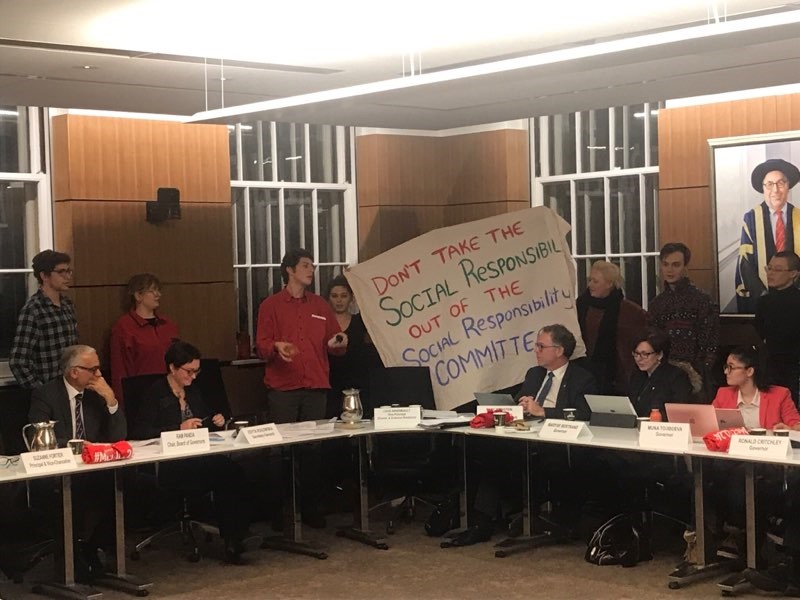The Dec. 12 McGill Board of Governors (BoG) meeting was forced to adjourn early after members of Divest McGill staged a protest. The group, which lobbies for McGill to divest its endowment funds from fossil fuel companies, demanded that the McGill community be consulted about proposed changes to the Committee to Advise on Social Responsibility (CAMSR) Terms of Reference. Prior to the interruption, the BoG passed the Policy Concerning Smoking at McGill University and received updates on the plan to integrate Royal Victoria Hospital (RVH) into McGill’s downtown campus. The Board of Governors is the highest decision-making body of the University, with final authority over all academic and financial affairs.
CAMSR Terms of Reference
The BoG considered approving a report by the Nominating, Governance, and Ethics Committee recommending appointments to BoG Committees, non-Board bodies, and Health Care bodies. The report also proposed an amendment to CAMSR’s terms of reference to add a clause mandating it to advise the university against using its resources to advance social or political causes.
Darin Barney, Associate Professor of Communication Studies and Representative of the Academic Staff to the BoG, proposed a motion to table the discussion of the report. He expressed concern that the BoG was not properly informed about the amendment prior to the meeting.
“CAMSR Terms of Reference are of interest to many people and several major changes to the mandate of the Committee were not prominently signalled,” Barney said. “The revisions were only received recently by the [BoG].”
Divest McGill members held a banner as they sang and chanted to interrupt the meeting, voicing their opposition to the proposed amendment and the lack of community consultations about it.
“We looked over the report and found the provisions unacceptable, and we believe that they should go through a community consultation first,” Divest McGill organiser James Flanagan, U2 History said.
Policy Concerning Smoking at McGill University
Yves Beauchamp, Vice Principal (Administration and Finance), announced McGill’s new smoking policy at the meeting. With the exception of four proposed smoking zones, the policy will make both of McGill’s campuses smoke-free by May 1, 2018. The planned smoking zones are located by the James Administration building, Schulich Library, Redpath Museum, and McIntyre Medical Building. McGill plans to phase out these zones by 2023, making both campuses entirely smoke-free.
The provincial Tobacco Control Act, passed by the National Assembly of Québec in 2015, requires colleges and universities in the province to adopt tobacco control policies geared towards establishing smoke-free campuses. Under the law, universities must establish smoke-free areas on campuses, discourage smoking, and foster initiatives in student associations to do the same.
“We want to make sure that the public understands that our campus will eventually be smoke-free,” Beauchamp said. “However, the establishment of transitionary smoke-free areas gives us time to evaluate the impact of a smoke-free campus. We want to avoid a rush of people [smoking] on University, Sherbrooke, and McTavish.”
Students’ Society of McGill University (SSMU) President Muna Tojiboeva expressed concern at the meeting that students would not be able to differentiate between the proposed smoking zones and McTavish street, which is public.
“We plan to speak to the City of Montreal, to see if it is possible to make McTavish non-smoking,” Beauchamp said. “There will also be signage indicating where smoking is allowed.”
Additionally, there are no plans to remove the smoking zones at Upper Rez or Solin.
“Upper Rez is isolated,” Beauchamp said. “Forcing students to go down to the street, particularly at night, is a potential safety issue.”
Royal Victoria Hospital Site Update
Peter Coughlin, co-founder of real estate and investment company Redbourne Properties and member-at-large on the BoG, presented an update on plans for the RVH site, which remains vacant. In March 2015, the government of Quebec gave McGill a grant of $4 million to fund research into how the site may be used. McGill’s current proposal to integrate the buildings into the University for much-needed teaching and research space will cost $650 million, of which the government of Quebec will pay $500 million. However, the BoG is still deliberating whether to move forward with the project.
“We are enthusiastic but it would be wrong to say that we don’t have concerns,” Coughlin said. “[We are concerned about] the additional costs associated with the heritage status of the buildings, the environmental impact of the construction, and the incurred costs of taking over other buildings on the site, as well as raising or borrowing $150 million [to cover costs].”
Coughlin wants reassurance that McGill is able to provide the funds before moving forward, and that the provincial government’s support won’t come at cost of other University initiatives.
“We also need an answer to the question, if Quebec funds RVH, will they continue to fund other projects on McGill campus?” Coughlin said. “We would like to go to the next stage, but only with a set of conditions that will minimise the risks for the university.”








